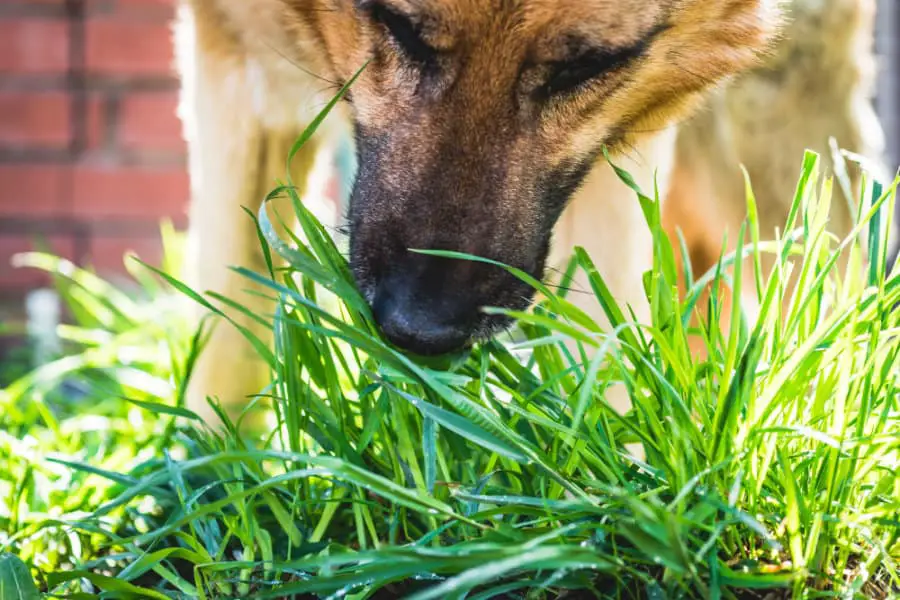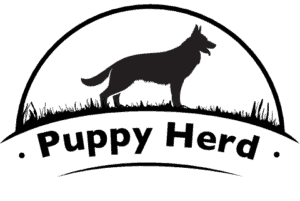German Shepherds like to run around open spaces, especially gardens. Now, what if you’re planting grass? This leads to the question, “Is coated grass seed toxic to a German Shepherd?” Well, the components of coated grass seeds may pose some risk to your dog’s health.
Broadly speaking, the toxicity rate of the coated seeds depends on the concentration of their coating ingredients such as insecticides and fungicides.
Stick around to learn more about whether coated grass seed is toxic to a German Shepherd or not.

What Are Coated Grass Seeds Made of?
Coated grass seeds’ outer layers are composed of various materials, but mainly clay. This clay provides the seeds with more moisture-locking properties during growth. For better reference, coated grass seeds are usually blue or green-dyed.
Now, the clay coating is also infused with other materials such as rhizobia, fungicide, insecticides, and fertilizer. This is mainly to give the seeds better protection, nevertheless, it’s a different story for your German Shepherd.
Toxicity Risks of Coated Grass Seeds to a German Shepherd
In terms of toxicity, coated grass seeds can either pose a low to high risk for your German Shepherd’s health. This depends on several factors.
For instance, if the dog consumed an excessive amount of the coated grass seeds, then they may mostly experience indigestion, diarrhea, drooling, lethargy, and vomiting.
Having said that, the fertilizer in the coating, if eaten, may have poisonous effects, depending on its concentration in the grass seeds.
Apart from that, some German Shepherds may be more sensitive to grass seed toxicity levels than others. In this case, the coated grass seeds may target its liver. To be on the safe side, contact your vet to check for your dog’s allergies.
Additionally, you can contact the manufacturer of the coated grass seeds and consult them on whether the material is pet-safe.
Health Concerns of German Shepherds Ingesting Coated Grass Seeds
Besides the toxicity levels of the coated grass seeds, these planting kernels can pose other health risks worth mentioning.
Choking Hazard
If your German Shepherd is trying to ingest the grass seeds, it may end up blocking its throat passageway. Each seed’s length is about ¼ to ¾-inch. Plus, their pointy ends create more risk for the coated grass seeds to get stuck in the German Shepherd’s throat or digestive tract.
With the seeds inside the dog’s body, it could cause lots of issues such as inflammation and bulges within the digestive tract. In addition to this, the German Shepherd may also experience swollen tonsils and serious internal damage.
This, in turn, may cause pain for your four-legged friend. Consequently, you’ll need to monitor its actions as soon as they’ve consumed the coated grass seeds.
If you notice any coughing, vomiting, or if the Shepherd is unable to properly eat or drink, then you may need to visit your vet. In severe cases, the vet might necessitate a surgical treatment to manually dislodge the grass seeds.
Paw Concerns
In other cases, the German Shepherd may not be too enticed with eating the coated grass seeds. Nonetheless, if it runs around the seed area for too long, some pieces could get in between its paws.
The coated grass seed pieces can easily penetrate through your German Shepherd’s paw skin and irritate it. The seed damage could make the dog limp, due to the pain in the area.
You’ll also notice lots of paw licking, redness, and inflammation. Subsequently, this could result in joint, ligament, and tendon damage.
Eyes and Ears Risks
If your Shepherd is sticking its head in the piles of coated grass seeds, some are likely going to get in its eyes and ears. If it happens to find its way into your dog’s eyes, you may see some tears, eye discharge, inflammation, and swelling in the area.
Due to the irritation, the German Shepherd will likely start rubbing its eyes, which may worsen its condition and cause infection. In more serious cases, the symptoms could lead to a corneal ulcer or loss of eyesight in the affected eye.
Besides that, if your dog is shaking its head more often than usual, then the coated grass seeds are likely stuck in its ears. Since German Shepherds have upturned ears, they’re less likely to have the seeds caught in their ears.
In case they do have seeds in there, they’ll likely keep scratching their ears in discomfort. Subsequently, they could develop an ear infection.
Nose Risks
Your German Shepherd’s first instinct when inspecting the ground is to sniff it. Once their snout touches the coated grass-seeded ground, some pieces are probably going to stick to their nostrils.
The Shepherd will then experience symptoms such as sneezing, nasal discharge, and they’ll also paw at their nose. Now, if they breathe in the seeds, the condition could advance to a lung infection and airway blockage.
How to Avoid the Risks of Toxicity from Coated Grass Seeds
If you want to prevent any health issues for your German Shepherd, it’s highly recommended that you don’t let them near the lawn.
The grass-growing process can take anywhere between a week to a month. If you want to remain cautious, you can keep the dog away from the lawn for approximately a month. This will reduce the risk of fertilizer, pesticide, or fungicide poisoning.
Conclusion
Is coated grass seed toxic to a German Shepherd? In short, coated grass seeds can be relatively unharmful to your dog. Regardless of this, some Shepherds may experience harsher symptoms than others.
For example, if your German Shepherd has a lawn fertilizer allergy, then they’ll likely be heavily affected by the coated grass seeds. Similarly, if the dog consumes copious amounts of coated grass seeds, it’ll likely vomit and get diarrhea.
For this purpose, you need to monitor your pet after it eats the seeds. Check signs for any infections, allergies, and appetite changes. If any serious changes occur, then immediately consult your vet for a proper prescription.
